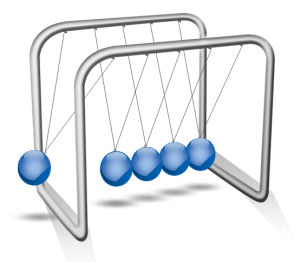 Watch the Final Four this weekend and I can guarantee two things: You’ll see lots of camera shots of celebrities and parents of players, and the word momentum will be spoken by the announcers at least once. You can watch any sporting event and hear that word – momentum – used almost with reverence. It is intangible force that gives teams that are behind hope, and teams that are ahead even-greater-confidence in the outcome.
Watch the Final Four this weekend and I can guarantee two things: You’ll see lots of camera shots of celebrities and parents of players, and the word momentum will be spoken by the announcers at least once. You can watch any sporting event and hear that word – momentum – used almost with reverence. It is intangible force that gives teams that are behind hope, and teams that are ahead even-greater-confidence in the outcome.
Of course, momentum isn’t just a sports phenomenon – sales people talk about, stock market watchers study it, and much more. Because of this, it isn’t surprising that leaders want to create it with their teams.
It is a worthy goal – why wouldn’t you want to find a force that creates an attraction to and energy for greater success? The question for us as leaders is can we manufacture momentum?
In short, yes we can.
Momentum in a ball game will be mentioned after one play – a 3-point shot, a turnover, or any other sort of pivotal play. Think about that. This magical thing called momentum comes from one play.
Ever had to tackle a really big task in your life?
Let’s talk about cleaning a closet. How do you get the closet cleaned? You pick up one item, or pull out boxes to sort into, or any one thing. Momentum on the task comes from . . . one action. By the way, cleaning the closet may or may not actually be a big task, but it feels like one, doesn’t it?
If you keep looking at a task and don’t know how or where to start, you don’t start. Yet inevitably, once you take some small action, the job seems more realistic and do-able, so you keep going towards accomplishing it… momentum.
You build momentum by starting.
Earl Weaver, the recently deceased baseball manager, talked about momentum this way: “Momentum? Momentum is the next day’s starting pitcher.”
You create momentum by getting started.
As a leader, you must lead – including in this way. If you want to build this irresistible force on your team or in your organization, put a premium on taking action, and start with yourself. Here are three tips to help make that happen.
- Just do . . .something. Perhaps the step you take is wrong, or not the best first one, but you start.
- Change the items on your to-do list. Don’t write “New product development”, write “Determine product title”, or “Make call to customer”, or whatever small action gets you started. With a full list already, how likely will you make progress on “new product development” today?
- Remember achievement mathematics. I’ve written about this formula before. Here is the key – tie daily action to purpose and important goals. Make that connection in small increments, and momentum will be created.
Doing this for yourself will change your world. As a leader, you need to leverage this to others, too. Do these three things for yourself, then teach others to do the same, through your example. It will create a new expectation, a new energy, and an irresistible attraction to your goals and greater results.
It will create momentum.
I’ll close with a powerful quotation from the German writer Johann Wolfgang von Goethe that illuminates this powerful idea. Read it now, and read it each morning for the next week – right before you take at least one action – action that will build momentum.
“Until one is committed, there is hesitancy, the chance to draw back — Concerning all acts of initiative (and creation), there is one elementary truth that ignorance of which kills countless ideas and splendid plans: that the moment one definitely commits oneself, then Providence moves too. All sorts of things occur to help one that would never otherwise have occurred. A whole stream of events issues from the decision, raising in one’s favor all manner of unforeseen incidents and meetings and material assistance, which no man could have dreamed would have come his way. Whatever you can do, or dream you can do, begin it. Boldness has genius, power, and magic in it. Begin it now.”

Your quote above should not be wholly attributed to Goethe. It was actually from WH Murray written in 1951 in his book The Scottish Himalayan Expedition. The last phrase is perhaps a lose paraphrase of a Goethe poem but to attribute these words to Goethe would be incorrect. It actually could have more weight to your point to consider that Murray was a Scottish Mountaineer and give him credit for his writings.
http://www.goethesociety.org/pages/quotescom.html
Thanks Tim.